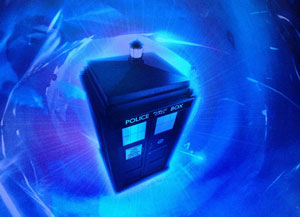
It was the talk of my school. The date was Saturday, November 23, 1963, and children's T.V. would never be the same again. Children's T.V., as it was called, was a slot of time on Saturday between all the sports coverage and the main 6 o'clock news. In the U.K. there were then only 2 channels, the BBC, the model for PBS, and Independent T.V. which was commercial. Given the lack of choice this is probably why there was none of the pre-show advertising for a brand new series that you'd expect today, just a fairly bland announcement saying Doctor Who which created lots of questions but absolutely no information. (The BBC did exactly the same thing a few years later with Monty Python's Flying Circus, which again just appeared in the program listing with no explanation whatsoever...but that's another story).
The moment arrived. It was around 5:30 p.m. and suddenly the screen erupted with this amazing music and totally new graphics which seemed to show a Police Box falling through something. (Police Boxes incidentally were very much in evidence back then in the U.K., I suppose for reclusive policemen who wanted a few minutes on their own). But it was the music that really grabbed me. The BBC have always been great innovators but for this one they scored a high five. None other than the famed BBC Radiophonic Workshop had been assigned to create this unique sound, a sound which from that time till now can summon whole families from around the house to come watch.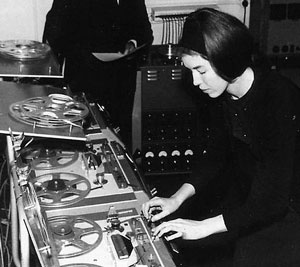
The person responsible for this sound was a young woman of just 26, Delia Derbyshire, a composer of electronic music (in photo left), who had recently been assisting none other than the great Luciano Berio. She took Ron Grainer's theme, realized it electronically, and made it iconic. So... really unique music for... a children's T.V. program. What was this about?
I remember the first episode very clearly (although I know there are "Doctor experts" out there who will want to correct me, I am sure) but I want to share my first impressions and my memory of a very important character. It all seemed pretty normal to begin with. A young girl at school. Two very interested and intelligent teachers talking about her brilliance but with lots of questions about her inconsistencies as well. The girl lives with her grandfather, so the teachers set off to have a bit of a chat with him. This is the first appearance of the Doctor played by the elderly William Hartnell and the first sight we have of the Police Box. Hartnell played the Doctor as a curmudgeon, always irritated, very quixotic.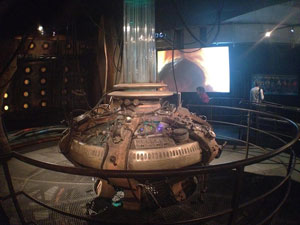
The teachers see the Police Box and experience its "aliveness" humming away with potent energy, and then, for reasons I can't remember, they are shown into the Police Box whose interior (in photo left) is ENORMOUS, demonstrating no possible correlation with the exterior size. The teachers are incredulous and ask question after question the main one being that this just doesn't make sense. There's a wonderful hint of an answer from the Doctor saying something like your T.V. contains images of objects much bigger than it is, and this is the same principle.
Then the big news. The name of the Police Box. The TARDIS, standing for "Time and Relative Dimensions in Space", although those words went by me so fast I only caught up with them years later. The Doctor decides to activate the TARDIS and the teachers stay for some reason, maybe to be with their student. The TARDIS comes to life and groans and roars its way into...time travel by disappearing. This was amazing and jaw dropping... and then the episode ended. But it started so many adventures in time and space and in all parts of the galaxy with so many evil villains focused upon bad things, and so many redemptive actions from so many good and heroic figures! From the very start, we experience one of the series' major dramatic themes, and its rather Hitchcockian. Nothing is as it appears...police boxes, tailor's mannequins, gas masks, Santa Claus, statues (see Angel in photo below), scarecrows, children's dolls...all have some malevolent force.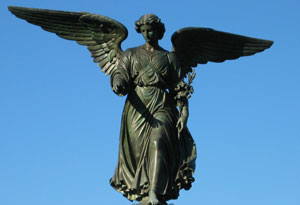
For me, the really great times with the Doctor happened when Hartnell decided to leave the part and the BBC introduced a new Doctor through the most wonderful metamorphosis. Suddenly there was Patrick Troughton, not saying a word for at least a whole episode, but constantly playing the recorder. At that point, the personality make-up of the Doctor started to ignite and become wholly original but with nods at other great and important characters - Puck, Don Quixote, Jacques, Oscar Wilde, Buddha, John Cleese, Stephen Hawking, your favorite elder brother or uncle, Epicurus, Montaigne. But most of all we recognized him in ourselves for what he was - an artist dispensing magic, heroism, morality, energy, knowledge and scientific explanations but with the brightness of spirit that only a musician, an actor or great painter could possibly possess. Dr. Who became a character bound by philosophy and passion and creativity. A gentle vulnerable hero. And at NEC, I can share with you, I enjoy many "Doctors" from the faculty and the student body (even an administrator or two) who bounce with the same bounce of excessive love of the whole starry sky of artistic and musical wonders.
"Jon Pertwee's flamboyant Doctor talks about and embraces failure as one of the great human freedoms."
There have now been 11 Doctors and I can remember virtually all of them. Jon Pertwee's flamboyant Doctor talks about and embraces failure "as one of the great human freedoms." His Doctor tells of a journey he took as a young man to his teacher and mentor who resided towards the top of a barren, grey and ugly mountain. He asks his mentor for advice, tells him his story which is consumed by his own needs and ego, but his teacher does not reply in words. Rather, he merely holds out his arms to indicate the mountain the Doctor has climbed, revealing not its ugliness but its color, its beauty, the shapes of the rocks, the play of light on trees. And then the Doctor realizes that this is reality and beauty, and cannot be missed, and that this is the most important lesson of his life lifting him away from his self-absorption.
Tom Baker, with that great voice, more curly hair than a plate of spaghetti, and of course...the longest rainbow-hued scarf in the world. There is an episode with Baker as the "ethical" Doctor, given the opportunity to destroy the emerging young creatures that would become the dreaded and most evil of all his foes, the Daleks (in image below). 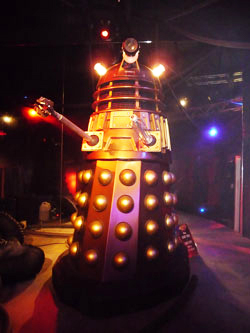
The power lies in his hands. He can press a button attached to some high explosive devices and kill the emerging foetuses and babies who would develop into these monsters. All the future peoples over all the future centuries who would be enslaved and attacked by this terrible alien being would not have to suffer. But he cannot do it. The moral dilemma for him is that he would be committing genocide and all those nations and planets attacked by the Daleks would be deprived of all those opportunities to create allies and friendships, to form societies challenged and improved by adversity. Yup. This was a children's program!
The show was axed by the BBC in 1989, and that famous theme tune was left in the archives, not able to summon friends and families to the T.V. for the Doctor. Then in 2005, it returned, this time with Christopher Eccleston as the Doctor (and succeeded by David Tennant, Matt Smith and, coming soon, Peter Capaldi). The program was totally different but totally and recognizably the same, and the Doctor had become a sort of amalgam of the best of the past but with a new energy and appeal. The BBC had certainly invested in better production values. No more cardboard cutouts or small plastic models. The opening credits now rival Star Trek, and the music has subtly changed, (I think the opening rhythm has gone from a driving triplet to a dotted figure, and there is an offbeat string riff which sounds new). The TARDIS has had an overhaul, although the Doctor still needs a hammer and some type of bicycle pump to make the engine work.
"His relations with his assistant/companion are always platonic and they are... sort of...but with a ton of sexual chemistry."'
Yes, the show is updated, but it retains its great humor, style and panache, for which I offer a few favorite examples: There's the Doctor's assistant/companion (I want to say that his relations with his assistant/companion are always platonic and they sort of are, but with a ton of sexual chemistry. I'm thinking in particular about Sarah Jane Smith and more recently Rose Tyler) who travels with him 5 billion years into the future to watch the end of the world. She is homesick and wants to speak with her mother who she realizes is dead by now. He asks to see her cell phone. Puts in a special device. She dials her mum and they speak. "Amazing" she says. "How can you do that?" "Oh it's easy," says the Doctor, "but you should see the phone bills." A throw away but beautifully done. Or consider the Aliens who take over the British Government. Well, don't we think all governments comprise aliens? Or the TARDIS having graffiti sprayed on it as it sits in a housing project in London.
The show can also be downright scary. There's one episode, set in London during WWII and the blitz in which a little 4 year old boy with a gas mask fixed to his face, asks similarly masked passersby "Are you my mummy?" That one is at the top of my list for creepiness.
Eccleston was an outstanding Doctor with a leather jacket, Liverpudlian accent, the broadest grin in the world, and a seriousness of moral purpose... "Everything ends, all things die." His metamorphosis to the next Doctor (David Tennant) was heroic and tender; turning to his assistant/companion Rose, he says as he changes and dies as himself, "Have a wonderful life, do that for me." Tennant kept the grin from time to time as a sort of idée fixe, but his Doctor was more romantic, stylish, humorous, the leather jacket changed for a suit and slim fit coat, with his hair blown into a shape resembling a recent Gehry concert hall. He was ethical too, bringing down the government of Harriet Jones (Prime Minister) for destroying the defeated aliens leaving on their "golden bridge." Beginning a stirring Henry the Fifth speech only to stop himself with "Wait a minute...that's the Lion King, isn't it?" Or fighting for the survival of the earth, sword in hand, in his pajamas.
"Wait a minute...that's the Lion King, isn't it?"
The standard of writing in every episode is of staggering quality and inventiveness. The stories have been written by people who fully understand, just as Oscar Wilde did in his children's stories, or Kenneth Grahame in Wind in the Willows,
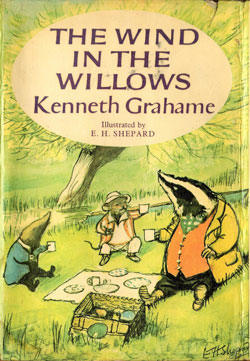 that for the stories to work for a young audience they have to be written for adults who still remember the magic of childhood.
that for the stories to work for a young audience they have to be written for adults who still remember the magic of childhood.
So why am I, a relatively mature and sometimes sophisticated 61 year old, writing with so much care and attention about this fictional character who came to life the day after Kennedy's assassination? Why are Time Lords essential? In a phrase, it's because I think the whole series is about one thing in all its storytelling fantasy: the extraordinary celebration of the creativity and durability of the human spirit. The Doctor tells us over and over again how amazing he thinks we are...taking risks, jumping without knowing, having the courage to be curious, to extend beyond our reach. And like all great stories, the Happy Prince, Don Quixote, The Odyssey, Dr. Who is one from which we can learn so much, one that affirms and reassures us that we are truly capable of the Extraordinary, if only we knew how to harness our amazing powers.
"The Doctor tells us over and over again how amazing he thinks we are...taking risks, jumping without knowing, having the courage to be curious, to extend beyond our reach."
![]()
I am presently making my way through the series via YouTube and enjoying the enormous fun that was Tennant's Doctor and I look forward to getting home from work most nights and summoning the whole family with Dum - da - dum - dum - da - dum - dum - da - dum - dee - dee - di - da - dum - da - dum. Now where did I leave my sonic screwdriver?? Happy 50th Doctor!